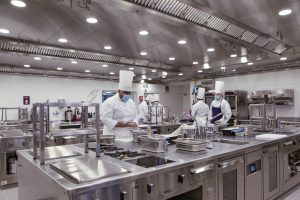Understanding the Difference Between Domestic and Commercial Catering Appliances

While domestic and commercial catering equipment may seem similar on the surface, there are significant differences that cater to their respective environments.
Level of Usage
In domestic settings, cooking equipment is typically used 2-3 times a day for short periods, considered light duty. On the other hand, commercial catering equipment is in near-constant use, with ranges, ovens, and grills operating for hours at a time. This heavy-duty usage demands a different level of durability and performance.
Size and Capacity
Domestic appliances are designed to fit into standard kitchens and are compact in size. They are typically limited to cooking meals for a small number of people. Commercial appliances, on the other hand, are larger and can handle greater capacities of food simultaneously, accommodating the needs of multiple tables and larger dining groups.
Power and Performance
While domestic equipment can produce tasty meals, there may be inconsistencies in results due to lower power output. Commercial kitchen appliances are designed to deliver precision and consistency under the demanding conditions of a professional environment. They offer increased power, allowing for faster cooking times without compromising quality.
Manufacture
Domestic cooking units often use standard materials to suit their light-duty usage. In contrast, commercial appliances are typically made with higher-quality materials that can withstand the rigors of heavy-duty use. This ensures durability and longevity.
Cost
Domestic kitchen appliances are generally more affordable, catering to typical family budgets. Commercial cooking equipment, however, is more expensive due to factors like higher-quality materials, larger size, increased power, and advanced technology. While the initial investment may be higher, the long-term benefits in terms of performance and durability can justify the cost.
Choosing the Right Catering Equipment
For hospitality businesses, selecting the right catering equipment is crucial. Commercial appliances must be able to withstand the wear and tear of daily use while maintaining high standards. Investing in quality equipment can be the difference between success and substandard results. Although commercial equipment may be more expensive, it can offer long-term benefits in terms of performance, efficiency, and durability.
Why Trust Cater2
With decades of experience, Cater2, Commercial Catering Equipment, has helped countless businesses find the perfect equipment to elevate their operations. They offer competitive pricing, dedicated customer service, and expert advice to guide customers through the purchasing process. Additionally, they provide aftercare support to ensure ongoing satisfaction.
Types of Commercial Catering Equipment
Commercial catering equipment encompasses a wide range of products, including:
- Cooking: Combi ovens, convection ovens, ranges, pizza ovens, microwaves, fryers, griddles, chargrills, steamers, bratt pans / cooking centres, pasta cookers, sous vide machines, toasters, waffle makers, and more.
- Food Prep: Food processors, mixers, blixers, graters, slicers, grinders, chippers, peelers and vacuum pack machines.
- Extraction and Ventilation: Filtration, baffle, condensate, and extraction canopies.
- Catering Fabrications: Stainless steel tables, shelves, racking, sinks, and gantries.
- Warewashing: Glasswashers, commercial dishwashers, cutlery and utensil washers, entry and exit tables, detergents, and rinse aids.
- Servery and Display: Heated merchandisers, bain maries, soup kettles, hot cupboards and chip scuttles .
Choosing Commercial Kitchen Equipment
When selecting catering equipment, consider factors such as your business type, kitchen size, number of covers, menu complexity, and budget. It’s also recommended to consult with your chef to identify specific equipment needs based on your menu.
Equipping for a Full Set-Up
A well-equipped kitchen should prioritize efficiency, space utilization, safety, and ease of use. Consider factors like capacity, output, power type, and warranty when choosing equipment.
Buying Catering Equipment On a Budget
While cost is a significant factor, it’s important to balance it with quality. Consider the long-term benefits of investing in durable, high-performance equipment.
Commercial Catering Equipment Leasing
Leasing can be a viable option for businesses with budget constraints. It allows for access to top-quality equipment without the large upfront cost.
By understanding the differences between domestic and commercial catering appliances and carefully considering your specific needs, you can make informed decisions to equip your kitchen for success.



